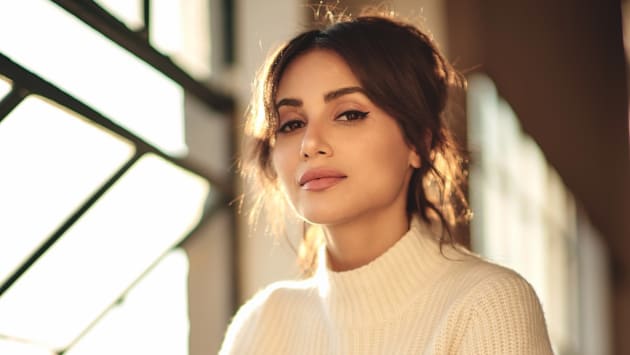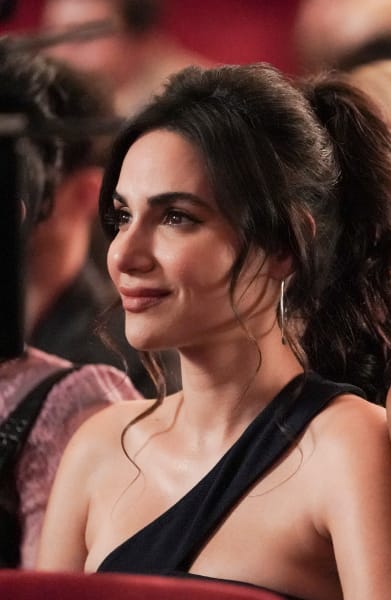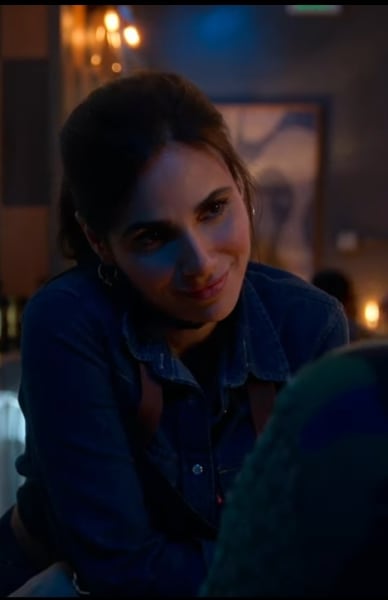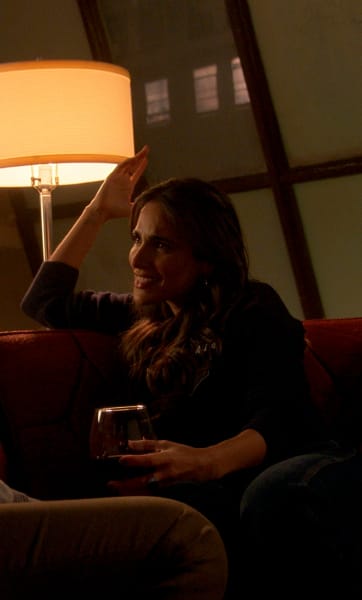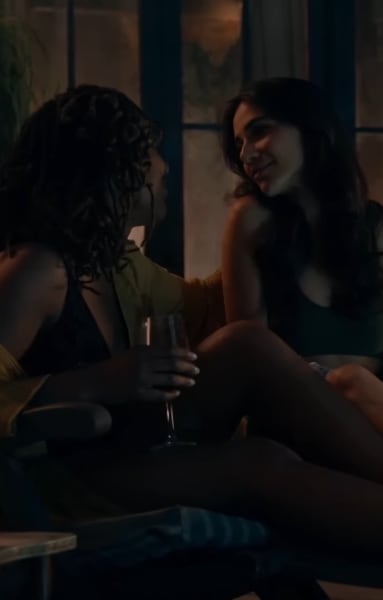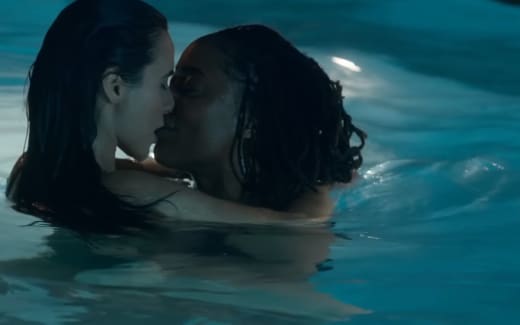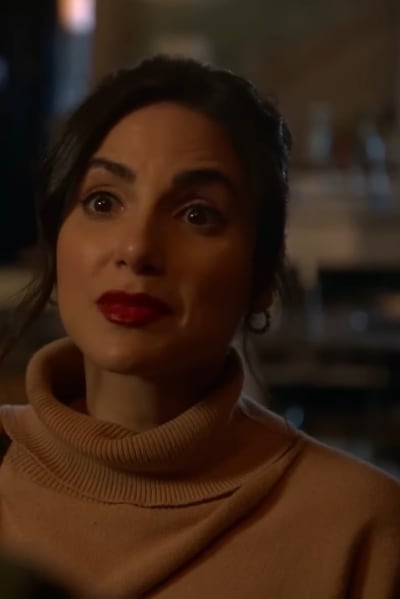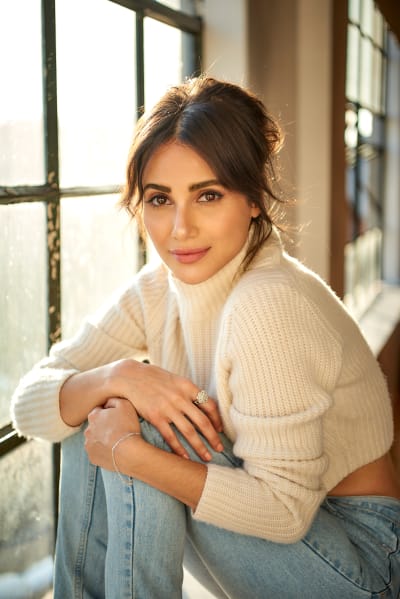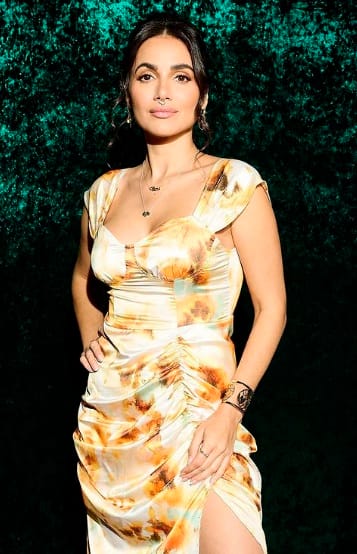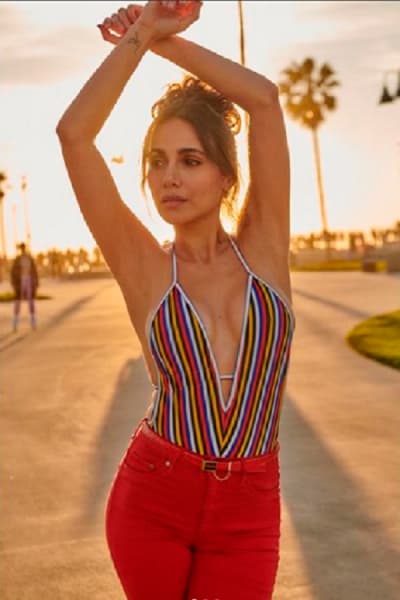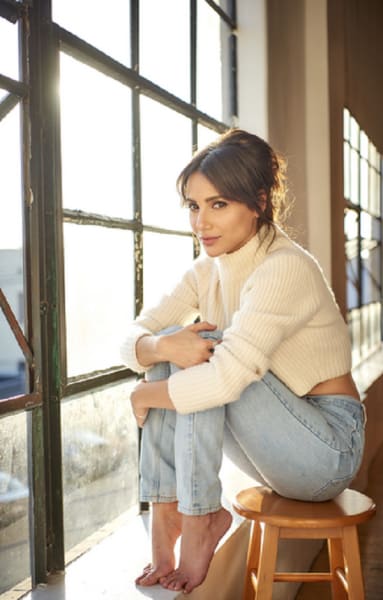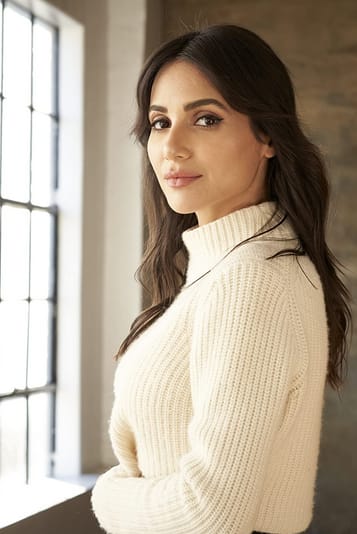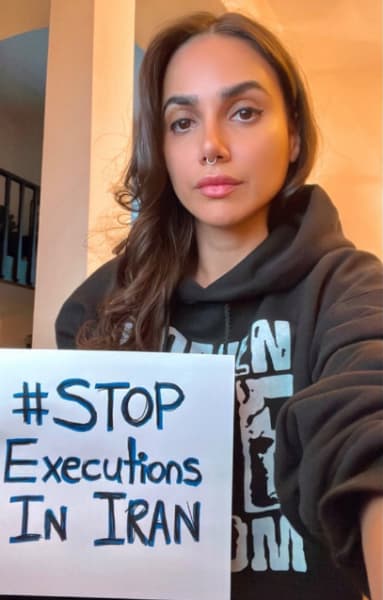Yasmine Aker is a force of nature.
She’s a wonderful, talented, and inspiring woman who is out to change the world onscreen and off.
While many know her as Angelica, Malika’s supportive but no-nonsense girlfriend on Freeform’s Good Trouble, she’s also a noteworthy activist and advocate who doesn’t seem to take a day off. She doesn’t just star in Good Trouble; she lives it.
Yasmine is as passionate about her craft as she is about advocating for Iranian, human, and women’s rights and destigmatizing mental illness and neurodivergency.
TV Fanatic had the absolute pleasure of speaking with Yasmine about her role as Angelica on Good Trouble and all her amazing work and what drives her to do it. Check out our compelling interview with this lovely actress!
Hi Jasmine!
Hi, Yasmine! We’re like name cousins.
Yeah, that’s right. We have the same namesake. It has to be a good omen!
Ah, since we’re on the topic of “good.” Let’s get into Good Trouble. What attracted you to the role of Angelica, and what type of impact do you hope she has on viewers who watch and connect to her?
Oh my goodness, yes. Angelica is one of my favorite roles I’ve ever played.
I feel like she is the closest to reality that it feels because not only is she lesbian. I’m bisexual, so not only is her sexuality kind of close to mine but how she interacts with the world is very similar to how real people genuinely interact with the world. She’s a very mature but very self-protective, guarded person.
It’s beautiful in the sense of representation because she’s smart, but then I don’t have to play her smart constantly. She’s an EMT; she’s studying to either attend med school or do something in medicine. But the writers don’t hit that note on the head because she’s also a bartender.
She’s also a member of the LGBTQ community. And she is not necessarily your cookie cutter — what Hollywood dictates what a quote-in-quote lesbian looks like. She truly looks and acts the way I feel many of us people in the LGBTQ community do.
She’s very much a chameleon. We kind of fit in everywhere and anywhere. No one really knows your sexuality unless you tell them or you are outwardly expressing it.
That’s a breath of fresh air for a show that is clearly very much in the know about how people really are, who they are, and the various communities that exist everywhere and how to represent them.
They definitely have their finger on the pulse regarding things like that. Now, you stepped in to play Angelica when Odelya Halevi left for Law & Order. Was it difficult to not only come into an established, close-knit show like this one but also an established role?
You know, it’s always difficult coming into any show in season three, season four, or season five.
I think there’s like memes about people showing up in season four
Yes, I’ve had the privilege of interviewing the cast a few times over the years, and they are one of my favorite casts. They pull you into their bubble with them for however long you speak with them, and it’s charming and cool.
Yeah, they’re all so warm. It doesn’t matter what hierarchy on the food chain they are. They are just so warm and welcoming, and everyone has so much humility and humanity that it makes everyone comfortable no matter where they fall in the food chain of the show.
Now, you and Zuri have great chemistry, and Angelica is one of Malika’s fan favorite love interests. She’s up there with Isaac, at least for sure.
You know, it was pretty natural. From day one, we’ve hit it off. We get on really well. We are both very warm and loving towards each other offscreen as we are onscreen. Of course, tumultuous differences happen onscreen where it’s like; it’s on, it’s off, it’s on, it’s off.
There’s all of that, but it was a very natural feeling. The chemistry is indicative of just how easy it is between us, even offscreen.
One of my absolute favorite things about Angelica is she’s a woman who knows what she wants and desires. She knows what she deserves. She’s very upfront, which I respect, especially in a female character.
Yeah, yeah.
What can we expect from her and Malika’s relationship moving forward this season?
Angelica’s very authentic. She knows exactly what she wants, and I admire her because, in real life, many of us know what we want, but we settle for less because we fear that we might lose the person. If we don’t give in to what they want, we might not be able to have them in our life.
She loves herself so much that she’s unwilling to receive anything short of exactly how she wants her life to be. And doing that isn’t necessarily easy for Angelica. It’s actually a very painful decision that she’s made.
She’s made a decision that’s best for her, higher good, but not necessarily the fun decision or the one allowing her to experience the full breadth of what she really wants to experience with Malika.
She’s an uncomplicated character who stands in her truth, even when it hurts herself. And I admire that about her. I can’t divulge what’s all going to happen between her and Malika, but they stay within each other’s orbits, is all I’ll say.
There’s a fascinating dynamic with Malika, Angelica, and Lucia. Will we see more complexities with those relationships this season?
That is probably permanent because when you’ve had a very deep and long-lasting relationship with an ex who happens to continue to be in your life, there’s a texture that doesn’t just disappear or go anywhere.
It was a beautiful note that they ended on during Good Trouble Season 4, which was Lucia showing her nice side, which seemed more sincere and helpful. I hope to see more of that where it’s resolving and doesn’t have to be as complicated.
But of course, you never know. I never know what’s in the heart of the writer. So I wouldn’t even be able to assume what will happen with Lucia, Angelica, and Malika. It’s hard even for us actors to know where it’s headed because they stay hush-hush until it’s written in the script.
Knowing that aside, what would YOUR ideal storyline be for Angelica?
Well, I think the ideal storyline for Angelica is for her to have the dream that she’s always wanted, which is to not infringe on Malika’s desires but to have Malika’s desires truly align with Angelica’s and to have a monogamous relationship that really lasts.
But with Angelica, one of the most important things is that she broke up with Lucia because Lucia wasn’t giving her the time of day. And so the issue with Malika is that even if Malika seems committed to wanting certain things, her actions speak otherwise because she’s constantly busy.
Now you are an incredibly busy and inspiring woman. I was reading up on your activism work, and it was genuinely moving. Do you see acting as its own form of activism?
I absolutely do. I absolutely do see acting as a form of activism because I feel like people take to heart what they see. Myself, when I was a child, I grew up watching Star Trek and learned so many important things about human rights and ethics from science fiction.
Shows can have a meaningful impact on how the public views and digests certain issues as they’re being thrown at them. So it’s actually a very important responsibility that more actors, writers, and directors should take to heart. We’re not just entertaining, but we are, in essence, teachers.
Every single one of us, we’re teachers, we’re teaching whether we like it or not; someone is learning something from every show and every movie they watch, whether it’s learning how to frame a shot or what diversity really means or what’s going on in Iran and learning about women’s rights and the lack thereof around the world.
It can have a considerable impact. We have to have far more reverence for that responsibility that’s hoisted on every single one of us who are entertainers.
As a fellow woman of color, I appreciate how much you advocate for mental health as well as neurodivergency. Having a brother who is autistic, I know how both issues are so heavily stigmatized, especially in Black and Brown communities. Is combating that stigmatization why you advocate for it so passionately?
Yeah, I feel many minority communities and communities of people of color still stigmatize a lot of different… I don’t even want to call them disorders because I don’t think they’re disorders, but differences.
When you are neurodivergent, there’s nothing wrong with you, but how you perceive the world and how you interact with the world is vastly different from someone who’s neurotypical. And most of the world is designed for able-bodied people; it’s very ableist.
We often forget. And because there’s so much stigma in my community — the Iranian community, it’s almost taboo to let people know that you have a certain thing. People try to hide it. If they know that their child has something, they won’t necessarily say it.
And I think more and more people who are on the autism spectrum and who do have ADHD and other issues going on with them, whether they have bipolar disorder, anxiety, depression, or whatever it is that they’ve been dealing with, healing with.
They should feel brave enough to bring it to the forefront so that the general public starts to see just how prevalent it is and how you can live a life as a professional with many of these disorders.
I hate to call them that, but many of these–
Quirks?
Of course, these are different quirks.
I feel very lucky because I’m a highly functional person on the autism spectrum. I’ve worked with people who are severely autistic, and my heart absolutely breaks especially when people are not able to speak; they’re not able to communicate what’s on with them. They can’t perceive what’s going on in other people’s facial expressions.
You have to imagine how terrifying it is to be in a world where you can’t read what’s happening around you.
Growing up, I felt that way myself; I always felt like everyone in the world received the handbook of what it means to socialize. They received the handbook on social interactions and mannerisms. They received this whole secret handbook on how things work. And I just never received the handbook.
I went through life really perplexed about so many things and feeling isolated, excluded, and confused. It took me an entire lifetime to learn about the human condition and how neurotypicals are and how to mask, read people’s faces, read people’s mannerisms, all these things.
Even to this day, eye contact is still difficult for me. And yet I’ve learned to do with neurotypical people. Sometimes I’m not as good at it when I’m in just regular life. I’m great at it when we’re on set because it’s like for short bursts of time while we’re shooting.
It’s like having these quirks that are just differences.
I feel sad when people say, “Oh, children with autism or adults with autism, they don’t have empathy,” because when you see them interact with other autistic people, you notice, “Wow, they actually have quite a lot of empathy,” when you see them interact with animals and even inanimate objects, they have quite a lot of empathy.
It’s just that social cues don’t translate the same for people with autism than they do for neurotypical people. And, of course, our world is not designed to teach neurotypical people how neurodivergent people receive the world. Everything is directed towards only how neurotypical people receive the world.
Can you tell me a little about what you’re working on now, whether it’s other projects or activism work?
Oh yeah. I am very fortunate that we could make a short film during this pandemic. And right now, we are in the film festival circuit. The short film is called Okay.
And it’s about mental health issues that this woman is dealing with after a divorce. And it’s fully subtitled. It’s half in Farsi, half in English. It’s my very first film that I’ve ever made.
Congratulations!
Thank you. We got to do it with a lot of amazing dear friends of mine. Elliot Knight was the director, and So Foreign productions produced it. These are my dearest friends. So it was really lovely creating something.
We won First Time filmmaker at the Dubai Film Festival. We got Best Actress at the Studio City Film Festival and received a few awards at other festivals. It’s exciting to take the film around and to have it finally be able to be seen and to see people’s reactions to it and to be able to connect with people through that.
And then, of course, we have a lot of things going on in the activist world. I’m working closely with various non-profit organizations specifically geared towards women’s rights or human rights for the people of Iran.
There are various things we’re doing on that front. I’m proud to be able to help with organizing rallies and events. I hosted these music and healing events for the people of Iran.
It’s been wonderful bringing together different healers, therapists, and mental health professionals to come together to create these kinds of multi-modality events that are so well received by the Iranian community.
They come and sing and listen to music and experience these different healing modalities and listen to therapists and learn how to cope with the trauma of seeing the revolution over and over and over for six months is traumatizing, and helping people deal with it feels like a privilege.
**This interview has been edited for length and clarity**
You can catch Yasmine Aker as Angelica on Good Trouble Thursdays at 10/9c on Freeform, or you can watch Good Trouble online right here via TV Fanatic.
To keep abreast of Yasmine’s tireless work and activism or to show her deserving love, you can follow her on Instagram @iamyasi.
Jasmine Blu is a senior staff writer for TV Fanatic. She is an insomniac who spends late nights and early mornings binge-watching way too many shows and binge-drinking way too much tea. Her eclectic taste makes her an unpredictable viewer with an appreciation for complex characters, diverse representation, dynamic duos, compelling stories, and guilty pleasures. You’ll definitely find her obsessively live-tweeting, waxing poetic, and chatting up fellow Fanatics and readers. Follow her on Twitter.
